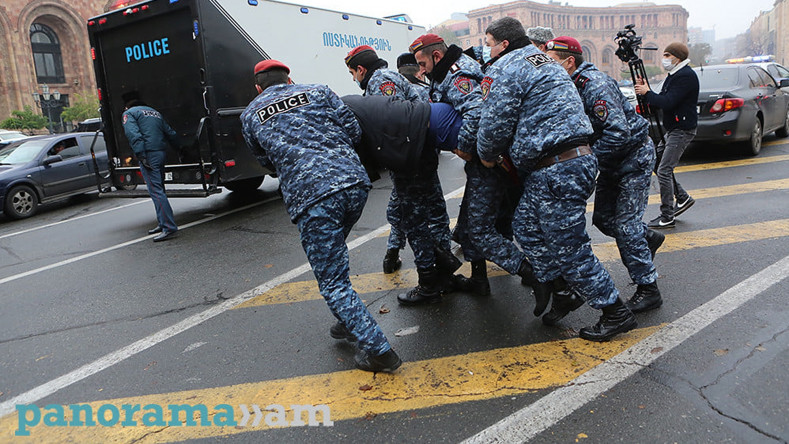
U.S. State Department report reveals torture, arbitrary detentions in Armenia
The U.S. Department of State has released its annual 2023 Country Reports on Human Rights Practices, saying significant human rights issues in Armenia included credible reports of torture or cruel inhuman, or degrading treatment or punishment by the government, arbitrary arrest or detention, as well as serious problems with the independence of the judiciary.
The report claims Prime Minister Nikol Pashinyan's government took only limited credible steps to investigate and punish alleged human rights abuses by former and sitting government officials and law enforcement authorities.
The local NGO community expressed collective concern regarding a notable increase in reports that members of the security forces tortured or otherwise abused individuals in their custody with impunity. According to human rights lawyers, while the criminal code defined and criminalized torture, it did not criminalize other cruel, inhuman, or degrading treatment. Officials often investigated instances of torture under charges of abuse of power, leading to lighter punishments.
Since July 2022, the Investigative Committee was responsible for investigating most torture cases, but according to human rights lawyers, committee investigators lacked experience in such cases. While the National Security Service was in charge of investigating allegations of torture committed by the Investigative Committee, human rights lawyers found these investigations lacked the independence, transparency, and public oversight required for credible inquiries.
Human rights activists asserted impunity for old and new instances of law enforcement abuse continued to contribute to the persistence of the problem, with alleged perpetrators continuing to serve in their positions or being promoted. On July 12, the National Assembly adopted changes to the criminal code allowing for the release of a perpetrator from criminal responsibility due to “active remorse” in cases of grave and especially grave crimes, an approach previously limited to light- and medium-gravity crimes. In August, the president signed the bill into law despite the protest of civil society representatives, who stated it contradicted the country’s constitution and international human rights commitments and would exacerbate official impunity, violate the rights of victims, and serve as a political tool if applied selectively.
The local NGO community noted an increased number of reports of abuse by police, including in police stations, which, unlike prisons and police detention facilities, were not subject to public monitoring. On July 3, more than 30 NGOs issued a statement noting “unprecedented violence and instances of torture in police departments and other law enforcement agencies” in recent months, characterizing the violence as becoming systemic and revealing what they viewed as ineffective police and judicial reforms. The organizations noted that violence against attorneys was unprecedented and that additional cases indicated a growing trend of police impunity. They stated the government’s failure to promptly investigate reports and bring perpetrators to justice resulted in impunity and decreased public trust in the law enforcement system. According to the July 25 report by the Helsinki Citizens Assembly Vanadzor on monitoring of police reform, there were 199 reports of human rights violation by police during 2022, a 20 percent increase compared with 2021 and 54 percent increase compared with 2019.
Criminal justice bodies continued to rely on confessions and information obtained during questioning to secure convictions. According to human rights lawyers, procedural safeguards against mistreatment during police questioning, such as inadmissibility of evidence obtained through force or procedural violations, were insufficient, as was a video surveillance system that was installed in only a few police stations and had not yet been used in police mistreatment cases. According to human rights lawyers, while many cases occurred in Yerevan, the situation in regional police stations was worse.
According to human rights lawyers, the frequent use of pretrial detention forced suspects to bear the burden of proof to demonstrate they did not present a flight risk or would not hamper an investigation. Lawyers said court detention decisions were unpredictable, with different restrictions placed on defendants in similar circumstances.
According to prison monitors and human rights lawyers, excessive and in their view often unjustified pretrial detention was applied, despite government efforts to increase the use of alternatives to detention as part of the government’s penal reform.
According to official statistics, in 2022, only 25 percent of bail requests were granted, while courts granted 70 percent of government detention requests.
Although the law provided for an independent judiciary, the judiciary was not viewed as independent or impartial due to its history of corruption and political influence, resistance to reform, and high-profile scandals. There were unconfirmed reports of attempts by the government and elements of the former regime to influence judges. The high case load, lack of public trust, and allegations of government pressure discouraged professionals from applying to judgeships.
There were continued media reports of selective application of disciplinary proceedings against “unfavorable” judges, and reports of lack of transparency in the Ministry of Justice’s decision-making process on whether to submit cases to the SJC for disciplinary proceedings. There was similar lack of transparency and no public oversight over the decisions of the Ethics and Disciplinary Commission of the General Assembly of Judges, a self-governance body of judges. Human rights lawyers reported cooperation between the Ministry of Justice and SJC on disciplinary proceedings, further undermining the independence of the judiciary from the executive branch.
Newsfeed
Videos






























